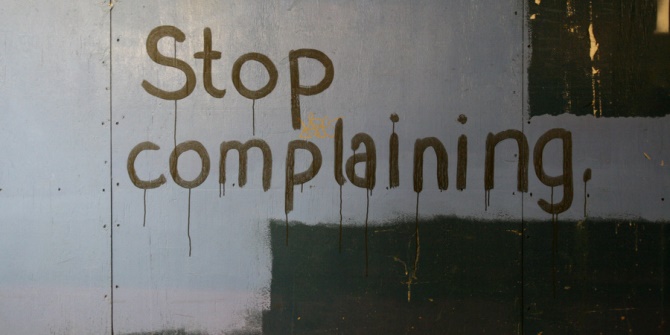 In trying to understand the dynamics of the public debate on immigration, Alex Balch and co-author Ekaterina Balabanova analysed over 500 newspaper articles in 2006 and 2013 to see the range of moral justifications employed when discussing immigration controls. They found a reduction in the range and balance of ideas informing the debate by 2013, with more liberal parts of the press following the right-wing focus on domestic social justice and security threats. He argues that this can be linked to the tactics of the then Labour government, which defended its policy on free movement with evidence of economic benefits, avoiding any moral or rights-based justifications that might have provided a different foundation.
In trying to understand the dynamics of the public debate on immigration, Alex Balch and co-author Ekaterina Balabanova analysed over 500 newspaper articles in 2006 and 2013 to see the range of moral justifications employed when discussing immigration controls. They found a reduction in the range and balance of ideas informing the debate by 2013, with more liberal parts of the press following the right-wing focus on domestic social justice and security threats. He argues that this can be linked to the tactics of the then Labour government, which defended its policy on free movement with evidence of economic benefits, avoiding any moral or rights-based justifications that might have provided a different foundation.
The latest panic over immigration, complete with a lengthy speech from the Prime Minister confirms what we all now know: British politics has become increasingly obsessed. All the mainstream parties regularly feel the urge to talk about the topic, and for the first time in the history of British democracy an anti-immigration party (UKIP) threatens to have a significant impact in next year’s general election, far outstripping the achievements of the BNP. How did we get to this place?
One of the frequent claims made from all sides is that in the UK the public debate has become increasingly ‘unbalanced’ or ‘toxic’, preventing reasonable discussion, leading to poor policies and fanning the flames of moral outrage. A key task for those interested in the politics of immigration is therefore to try and understand and explain the dynamics of the public debate: what the role of the media is, and what makes discussion of immigration turn in a more ‘liberal’ or ‘illiberal’ direction.
We have created a method for examining public debates that uses ‘framing analysis’ to specifically focus on the range of moral justifications that are employed when discussing immigration controls. This helped us to explore which underlying ideas informed arguments in the UK on transitional arrangements for Bulgarians and Romanians in 2006 and 2013 – two years when the subject rose to the top of the political agenda. We analysed over 500 articles in the two 12-month periods, taken from The Guardian, The Independent, The Daily Telegraph, Daily Mail, The Mirror and The Sun. The results showed a dramatic increase in the quantity of coverage but a progressive diminution in the range of justifications that were present.
In the second period we found nearly all the arguments employed were based on a narrow range of communitarian arguments relating to domestic social justice or threats to public security (92 per cent of the total). This contrasted with 2006 when these arguments were dominant but to a significantly lesser degree. In this earlier period more of the coverage (particularly in the ‘liberal’ Guardian, Independent and their weekend editions) included ‘cosmopolitan’ arguments, justifying free movement on the basis of human rights or mutual benefits – including cultural ones (24 per cent of the total, compared to only 8 per cent in 2013). This meant there was more of a kind of ‘left versus right’ fight over the issue in 2006, with a greater pluralism of ideas compared with what was to come later. What we see in 2013 is the more liberal parts of the press withdrawing from a cosmopolitan outlook – either choosing not to cover the topic, or following the right-wing focus on domestic social justice and security threats, leading to a markedly less ‘balanced’ debate.
How can we explain this reduction in the range and balance of ideas informing the debate? Clearly one would expect welfare chauvinism to increase during harder economic times, and indeed we found this: instances of these arguments nearly doubled between 2006 and 2013. But the dehumanising tone 2013 was still quite shocking for some, likened to a kind of moral panic. Our argument is that the seeds for the moral panic of 2013 were sown in the earlier period and can be linked to the tactics of the government of the time. In 2006 the then Labour government defended its policy on free movement with evidence of economic benefits, avoiding any moral or rights-based justifications that might have provided a different foundation. Instead economic nationalism and GDP (aggregate, rather than per capita) growth were the arguments selected to challenge negative fears about immigration. This ‘positive’ narrative of managed migration appeared to provide a limited opening for a wider range of ideas, but by 2013 this would be slammed shut by a backlash fuelled by the chauvinistic dynamics of recession politics.
Plenty of research has demonstrated that media coverage is prone to inaccuracies and exaggerations about immigration patterns, and stereotyping of immigrants themselves. This perhaps helps us to understand the gap between perception and reality in public awareness, but it does not measure the direction of the debate or tell us much about the underlying arguments. Discourse analysis is another technique that can highlight problematic conceptual linkages and usage of language in public debates, but again this only hints at underlying values, or how these might be changing over time.
Other research has found that media coverage of this issue has been problematic. Oxford University’s Migration Observatory, for example, showed how the press frequently made associations with crime and anti-social behaviour and used certain kind of language (flooding metaphors). One issue with this research however is that it tends to simply echo widely held assumptions about differences in ‘quality’ between the tabloids (bad) and the broadsheets (not great, but significantly better). This leads to the usual condemnations of tabloid journalism and praise for ‘liberal’ titles that provide space for alternative voices. But our research shows this is not just a Daily Mail issue: there has been a significant shift in the ideas that have enjoyed currency in the mainstream press in recent years.
We argue that the panic over Bulgarians and Romanians in 2013 and the continuing obsession with immigration in 2014 are the rotten fruits of the main political parties’ dysfunctional strategies over immigration in recent years. On the left, Labour is suffering a long backlash against the faith it placed in a technocratic solution to its perennial problem with the topic. On the right, the Conservatives look like being punished for their complacency in believing that they could not lose in adopting a negative approach. Together they have conspired to dehumanise the debate and make the unthinkable, thinkable. The rise of UKIP threatens to challenge nothing less than an orthodoxy of political science – namely that the British electoral system protects against an anti-immigration party.
Note: This article gives the views of the author, and not the position of the British Politics and Policy blog, nor of the London School of Economics. Please read our comments policy before posting. Featured image credit: The Open University (CC-BY-SA-ND-NC-3.0)
 Alex Balch is Senior Lecturer in International Politics and European Integration in the University of Liverpool’s Department of Politics.
Alex Balch is Senior Lecturer in International Politics and European Integration in the University of Liverpool’s Department of Politics.








Alex Salmond says he wants to lead a group of SNP MPs in Westminster to try to get some say on a separate immigration policy for Scotland. The Scottish population is barely higher than it was in 1951 due to excessive emigration. Scotland has one third of the UK land surface but the whole population is only about 5.25 million – less than London. Scotland needs larger numbers of immigrants to replace those who have left but Westminster has a Londoncentric policy that benefits nobody outside London.
Immigrants do not place a massive burden on our health service. This is a lie.
30% of NHS doctors and dentists are immigrants.
50% of NHS nurses and care assistants are immigrants.
90% of NHS cleaners and ancillary staff are immigrants.
7% of NHS patients are immigrants.
Those that take from our society are Brits that prefer to live on Benefits rather than work and the politicians who claim a total of £100 million a year in allowances, expenses and subsidies not including their massive salaries and pensions.
What the Tory party have done is split up British families, nearly 6000 of them, with children too through tyrannically putting through parliament draconian rules just to keep immigration down. It hasn’t even worked because of the EU issue, ukip are simply a joke party, ask anyone what they think of their policies other than immigration and they haven’t got a clue, what is the problem with immigration?, I think it is being used as a scapegoat to brainwash the public into focusing on what is not the problem when in fact they are loosing not just money, but their rights, freedom and democratic say in anything, the rich minority are cutting away at the poor, they even go so low as to try and make you believe that it will be a blessing to loose your human rights!!!, the Labour Party are painfully quiet about the whole situation too, I would have thought by now they would pick up on much of this potential election winning debate, but no, they seem so scared of loosing that they’ve jumped in too on the “we must keep immigration down” propaganda. Immigrants on the whole work harder than the british, and families are the foundation of human life are they not ?dont let this especially right wing propaganda fool you or you will see another Hitler mark my words.
Your essay lost its way as soon as you incorrectly called UKIP an ant immigration party, there is a vast difference between being anti immigration and wanting control of you own borders so that immigration can be controlled, instead of the unfettered immigration which is currently flooding he jobs market with cheap labour, a right wing ideal, and placing a massive burden on our health service. Skip wants immigrants that add to our society not take from it, in much the same way as the majority of the world outside the venomous tentacles of brussels.